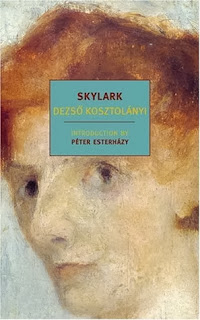 Skylark
Skylark By Dezső Kosztolányi
Translated by
Richard Aczel
Publisher: NYRB Classics
Pub. Date: 2010
First published in 1924
ISBN: 978-1590173398
Pages: 222
Genre: Literary fiction
Source: Public Library
Goodreads
Reading Challenge
Buy Link
Review:
I had the privilege
to travel to Hungary back in 1988. Although the country was still under a
totalitarian regime, this trip was very enjoyable for me. I believe part of my
heart remained in this very attractive country, with hauntingly beautiful
landscapes. Budapest is such a gorgeous European capital city. And you have the
romantic Lake Balaton, and unforgettable countryside areas.
So for my reading
challenges to cover 52 countries, I had to read one of the many famous
Hungarian authors. I chose this classic, as it was available in my library.
The story takes
place at the beginning of the 20th century. It’s about a very plain unmarried
woman, Skylark, 35, lacking in intelligence and beauty, who takes care of her
parents, doing the house chores. They idolize
her, even though it looked to me as if she was holding them a bit slave, not
allowing them to get out of their tedious daily life habits.
Then one day, she
leaves to spend one week away with some relatives. During that week, her parents progressively
relearn to live their own lives, to socialize with former friends and to go
out, to the point of the unthinkable.
I didn’t find Skylark
really outstanding, maybe because I would have expected something longer
and going even deeper into character
development. But I enjoyed it as a moody, sad and beautiful book, quite a
reflection of the Hungarian soul, according to me. I liked the evocation of the
nostalgic beauty of a small Hungarian city, of life there and its inhabitants.
There’s a lot about music and the arts, and ironic remarks on the society of
the time.
You can find here more details about the book and a quotation I really liked.
*Disclaimer - I
checked out this book at my public library*
About the Author:
Dezső Kosztolányi
was a famous Hungarian poet and prose-writer.
Kosztolányi was born in Szabadka (Subotica) in 1885, then part of the Austro-Hungarian Empire, but which now lies in northern Serbia. The city serves as a model for the fictional town of Sárszeg, in which he set his novella Skylark as well as The Golden Kite. Kosztolányi studied at the University of Budapest, where he met the poets Mihály Babits and Gyula Juhász, and then for a short time in Vienna before quitting and becoming a journalist--a profession he stayed with for the rest of his life. In 1908, he replaces the poet Endre Ady, who had left for Paris, as a reporter for a Budapest daily. In 1910, his first volume of poems The Complaints of a Poor Little Child brought nationwide success and marked the beginning of a prolific period in which he published a book nearly every year. In 1936, he died from cancer of the palate.
The literary journal Nyugat (Hungarian for "West"), which played an invaluable role in the revitalization of Hungarian literature, was founded in 1908 and Kosztolányi was an early contributor, part of what is often called the "first Nyugat generation", publishing mainly in poetry.
Starting in the 1920s he wrote novels, short stories, and short prose works, including Nero, the Bloody Poet (to the German edition of which Thomas Mann wrote the introduction), Skylark, The Golden Kite and Anna Édes. In 1924 he published a volume of verse harkening back to his early work, entitled The Complaints of the Sad Man.
Kosztolányi also produced literary translations in Hungarian, such as (from English, at least) Shakespeare's "Romeo and Juliet", "The Winter's Tale", Lewis Carroll's "Alice in Wonderland", Thornton Wilder's "The Bridge of San Luis Rey", Lord Alfred Douglas' memoirs on Oscar Wilde and Rudyard Kipling's "If—". He was the first authentic translator of Rilke's poetry, and he worked a Hungarian masterpiece after Paul Valéry's "Cimetiere Marin". [Goodreads]
Kosztolányi was born in Szabadka (Subotica) in 1885, then part of the Austro-Hungarian Empire, but which now lies in northern Serbia. The city serves as a model for the fictional town of Sárszeg, in which he set his novella Skylark as well as The Golden Kite. Kosztolányi studied at the University of Budapest, where he met the poets Mihály Babits and Gyula Juhász, and then for a short time in Vienna before quitting and becoming a journalist--a profession he stayed with for the rest of his life. In 1908, he replaces the poet Endre Ady, who had left for Paris, as a reporter for a Budapest daily. In 1910, his first volume of poems The Complaints of a Poor Little Child brought nationwide success and marked the beginning of a prolific period in which he published a book nearly every year. In 1936, he died from cancer of the palate.
The literary journal Nyugat (Hungarian for "West"), which played an invaluable role in the revitalization of Hungarian literature, was founded in 1908 and Kosztolányi was an early contributor, part of what is often called the "first Nyugat generation", publishing mainly in poetry.
Starting in the 1920s he wrote novels, short stories, and short prose works, including Nero, the Bloody Poet (to the German edition of which Thomas Mann wrote the introduction), Skylark, The Golden Kite and Anna Édes. In 1924 he published a volume of verse harkening back to his early work, entitled The Complaints of the Sad Man.
Kosztolányi also produced literary translations in Hungarian, such as (from English, at least) Shakespeare's "Romeo and Juliet", "The Winter's Tale", Lewis Carroll's "Alice in Wonderland", Thornton Wilder's "The Bridge of San Luis Rey", Lord Alfred Douglas' memoirs on Oscar Wilde and Rudyard Kipling's "If—". He was the first authentic translator of Rilke's poetry, and he worked a Hungarian masterpiece after Paul Valéry's "Cimetiere Marin". [Goodreads]








No comments:
Post a Comment
“The plot thickens… especially when you comment.” 〜B.J. Burgess